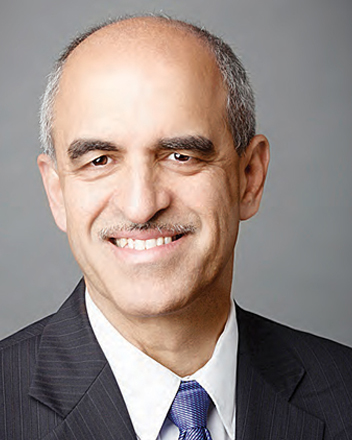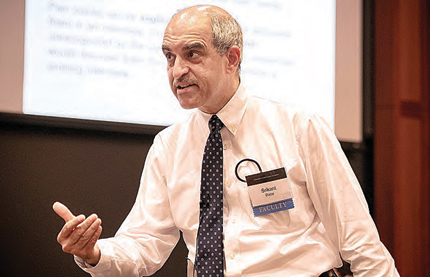"Free Yourself from Functional Fixedness"

Prof Srikant Datar, an alumnus of the Indian Institute of Management, Ahmedabad and a renowned name in the field of innovation and academic research, was recently appointed the 11th Dean of the 112-year-old Harvard Business School. A global authority in design-thinking and innovation, he is on the Board of several international corporations. He is co-author of the wellacclaimed book, 'Rethinking the MBA: Business Education at a Crossroads.' On the occasion of this singular elevation, here we bring a glimpse into what he has said about his childhood, parental values that shaped him, why Indians do well in the USA and how the pandemic gave a fillip to innovation

Agraduate with distinction from the University of Mumbai, Prof Srikant Datar is also a gold medallist from the Indian Institute of Management, Ahmedabad, and the Institute of Cost and Works Accountants of India. A Chartered Accountant, he holds two Masters degrees and a PhD from Stanford University.
A dedicated and innovative teacher, Dr Datar received the George Leland Bach Award for Excellence in the Classroom at Carnegie Mellon University and the Distinguished Teaching Award at Stanford University. He teaches MBA and Executive Education classes in design thinking, innovation, big data, and strategy implementation. He has co-authored a leading cost accounting textbook, 'Cost Accounting: A Managerial Emphasis' and 'Rethinking the MBA: Business Education at a Crossroads'
Dr Datar's research work is published in several prestigious journals. He serves on the Board of Directors of ICF International, Novartis AG, Stryker Corporation, and T-Mobile US, and has worked with many corporations on consulting and field-based projects. He is a member of the American Accounting Association and the Institute of Management Accountants.
Datar has now been appointed as the 11th Dean at the 112-year-old Harvard Business School. He will succeed Nitin Nohria, also an Indian who served for a decade in this coveted post.
Nohria has high words of praise. After the official announcement of Datar's appointment, he stated in The Harvard Gazette: "Srikant is an outstanding choice as Harvard Business School's next Dean. He has thought deeply about the challenges and opportunities facing management education. He has a proven record of collaboration, innovation, and leadership not only within HBS but across Harvard and at other organisations. He is deeply respected for his judgment, admired for the genuine enthusiasm he brings to his research and teaching, and beloved as a colleague. I am confident, through the remainder of the pandemic and beyond, that he will chart an inspired course for the School."
"India has done a good job of adapting knowledge developed in the west to the Indian context. I also value the emphasis that many Indian schools place on social issue"
LEGACY OF VALUES
Prof Datar states with pride that his values come from his hard-working and educated parents who were sensitive to the community they lived in. He comes from a highly academic background. On a Facebook interaction with Shiv Nadar Foundation's Saurav Adhikari, Senior Advisor, Shiv Nadar Foundation, he stated, "I come from a very close-knit family. Both my grandfathers were doctors. My paternal grandfather was a well known doctor in Miraj and also an entrepreneur. My maternal grandfather, Padmabhushan Dr C G Pandit was a medical scientist, a virologist and the founding director of the Indian Council of Medical Research (ICMR). He combined his tremendous knowledge of science with great humanity. I remember that people were coming to him with problems and going back with solutions people coming to him with disappointments and leaving with hope. He founded the Lal Bahadur Shastri College of Nautical and Engineering College, which prepares students to join the Merchant Navy. He taught my brother, Gautam, and me, to always act with discipline, courage, and integrity.
Prof Datar came to learn about the bitter truth about money when he was just 12-13 years old. He recalls being invited by a friend for a birthday party at the race course. He asked his father for five rupees, but he says his father explained that if he were sure that he would lose, he would give him the money. "His big worry was I would win. He said that it was up to me as to whether I go to the birthday party or not. Then he went on to explain that there would be many instances in my life when I might be the only one who took a particular stand, so I should think carefully, not just follow what others were doing. I went to the party, and I hung out with a close friend. We won a lot of money, but when we went to get ice-cream after all that winning, we discovered that his pocket had been picked. I learnt many lessons that day. I always remember that incident, and how I thought and acted, many years later."
Datar's mother, the Late Sarlatai Datar, was a popular corporator of the Pune Municipal Corporation (PMC). Says he proudly, "My mother was an editor and a social worker, so it was a very cerebral household. I think the various values I have learnt were essential. She was an elected member of the PMC. She was known for her work in the constituency. She had got water connection for every household in the slums, in her constituency. When she passed away in 2005, I was surprised to see many children come to pay their last respects. I asked them why they came-it not a place for children. One of them said that their mothers had sent them. They said, every morning when they turned on the tap, they remembered this lady who helped them. 'And today is the last day you will be able to see her face, and so each morning when you turn on the tap, we want you to remember who this person was. She taught us that life lived well is measured not by what one does for oneself, but what one does for others'."
Datar says his sporting spirit was instilled into him by his mother. Says he, "I am very fond of tennis; my mother introduced me to the sport. She was an outstanding tennis player. I go to the US Open from time to time and outside the stadium, there is a quote which says, 'From what you get, you make a living. What you give, however, makes a life'."
In his keynote address at the SP Jain Institute of Management & Research in 2019, Prof Datar explained how Gandhiji's Salt March was a sterling example of design thinking applied to strategy and leadership. He said, "Most freedom movements and revolutions are violent. Gandhiji's innovation was to lead the Indian independence struggle on the principles of non-violence. His approach covered the arc of design thinking from deep understanding and empathy for the people he was leading, to developing the idea of Satyagraha. He ran several experiments (what we now call prototyping) to test those ideas first in South Africa and then in India. The Salt March represented the implementation of this innovation. If you go through the steps of design thinking and go through what Gandhiji did, there is almost a complete parallel to how design thinking is applied to bring about large-scale changes in society. The basic principles are the same. You have to understand the people you are trying to influence deeply, you develop new ideas, you test those ideas, and then you implement them."
"Design thinking is the way of thinking innovatively and creatively about difficult problems. You can think about these challenging problems as a series of step"

FORMATIVE IIM-A
Datar's father wanted him to join the IAS, but soon he got interested in pursuing his MBA. Says he, "Firstly, going to Ahmedabad was a dream come true. I think my experiences at IIM-A were very formative and influenced the decisions that I took later. It was such a memorable experience, the idea of the case-method teaching, that IIM-A founded with a lot of support from the Harvard Business School. The same sort of methods and approaches are used there. I was coming prepared for class, listening and observing, absorbing alternate points of view, taking and defending a stand, making judgements. The teaching quality was truly incredible. My fellow students were fantastic in every way. I felt, if I had so much fun being a student, then how much fun would I have in academia."
A WORLD OF IDEAS
Datar says he loved the world of ideas, scholarship and research. He elaborates on how he felt that academics was a more exciting field than the corporate world. States he, "I also thought that I could perhaps have a more significant impact through my writing than working in the corporate world. The fact that I loved to teach was an essential factor. I saw how my father enjoyed teaching. I knew the respect that he got from his students, giving them the greatest gift that anyone can provide-knowledge. I got to work on whatever I loved. I got to be my boss. I was free to express my views. It was just a combination of my experience at IIM-A, the opportunities it provided, the excitement that it offered in terms of teaching and research, which propelled me to consider a career in academia. I never regretted it."
To a question by Saurav Adhikari, as to how he got the Stanford University scholarship at a time when many students from middle-class families could not get to go to America, Datar had said, "My wife Swati and I were just married at that time. We were leaving to do PhDs. Both of us had good scholarships. Swati had to work as well, to help us in our daily living. I remember it extremely fondly because all of that paled into insignificance because of the academic atmosphere at Stanford".
MEETING A MENTOR
Narrating an incident at Stanford University, Datar states, "I will tell you about an incident when I went to Stanford. I had studied from Prof Honron's Cost Accounting textbook in India, and so when I saw this person, this giant figure in the field, and he came up and shook my hand, I was completely taken aback; I knew him as Professor Honron. I can tell you till this day that it took me a while to call him by his name. But that's how informal and close relationships are, among faculty. Positions didn't matter, only ideas did. Academic training was excellent; we were encouraged to work on big problems. And more than financial support, the encouragement and support we got from intellectuals was what made the culture so extraordinary. It was a fantastic time.
WHAT DRIVES INDIANS?
What is it that makes Indians successful, despite our education system that is criticized so much? To this Datar replies. "That is an interesting point. There are many reasons why people have gone out and done well. First is the brilliance, talent and inner drive. Even as I have done my work on design thinking and innovation - and I believe I can get much better at it. We know that there is an abundance of talent. There is no question that brilliance, talent and inner drive are part of the story."
CONDUCIVE MILIEU
Datar feels that Indian students are inherently curious. He further adds, "Even in the existing education system, they had the opportunity to have outstanding teachers as I did, who taught me how to learn. The best institutions in India are very good in the education that they impart, although we lack in research. I think back on the education that I had at IIM-A and what it did was, as I was describing earlier, truly special. In these institutions, you get to meet other talented individuals and you get to learn from them. Many of us came from homes where the atmosphere was such that education was important. The co-curricular and extracurricular activities that we were engaged in also developed our leadership and teamwork and so. I remain hopeful and optimistic."
THINK INNOVATIVE
From mathematics, economics, statistics and finance, Datar moved on to design thinking and innovation. He holds the Chair of Havard's Innovation Lab. To the question , "If you apply those design principles to the post-covid situation, what would it be like?" Datar explains: "Design thinking is the way of thinking innovatively and creatively about difficult problems. You can think about these challenging problems as a series of steps. The first one is observing with empathy, how you walk in somebody else's shoes. The second would be the way you reframe problems, may be in a particular business. Suppose you are selling a medical product, what if I defined it not just as selling a product, but trying to come up with a patient-solution? How I might think about the patient-journey map and therefore, how I might now rethink what it was that I was doing? The next step is to generate ideas. Generation of ideas should be systematical, using brainstorming. There are also tools which help you to generate ideas systematically."
"I thought that I could perhaps have a more significant impact through my writing than working in the corporate world. The fact that I loved to teach was an essential factor. I saw how my father enjoyed teaching. I knew the respect that he got from his students"
UN-FIX THINKING
Explaining the basic theory behind why you can generate ideas systematically, he says, "We have some fixed ways in the way we think, so we refer it to as functional fixedness, relational fixedness or cognitive fixedness. I have a view. I think about a particular problem in a specific way. That is helpful in many things that we do, but when it comes to innovating, I have to break out of the fixedness to change how I think. And there are marvellous tools to do it. So what design thinking and problem thinking would do is to come up with, and ideate different ideas. Then you try to prototype it and experiment with it to come up with solutions. We call it rapid prototyping. These are the steps in design thinking. Regarding the application of design thinking to the Covid-19 pandemic, it has accelerated the move to digital and online technology, so what would have taken two to three years has occurred in a few months in businesses and organisations. It has spurred a lot of innovation, quickly."
FOCUS ON PRIMARY LEARNING
In an interview to Business World, Datar threw light on education in India, saying, "There is considerable evidence that education is the key to addressing many social problems. India lags behind developed countries in primary and secondary education. Without this foundation, Indian youth cannot benefit from university education. The government needs to play a bigger role to ensure quality education at the school level so students in schools are learning well."
"When it comes to higher education, India will need to think about online, digital and distance education. We are experimenting with these approaches at Harvard. Some question as to whether the quality of online education is as good as face-to-face interaction. My experience is that well-thought-out online programmes provide a very good learning environment for students. As the technology and bandwidth improve, the ability for faculty to interact with students also improves."
"India has done a good job of adapting knowledge developed in the west to the Indian context. I also value the emphasis that many Indian schools place on social issues."